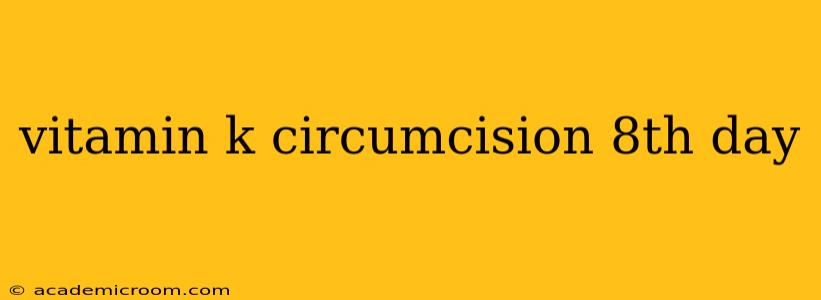Circumcision on the eighth day after birth is a common practice in some religious and cultural communities. This timing often raises questions regarding Vitamin K administration, a crucial vitamin for newborn health. This comprehensive guide addresses the relationship between Vitamin K, circumcision, and the eighth-day procedure, providing accurate and reliable information for parents and healthcare professionals.
What is Vitamin K and Why is it Important for Newborns?
Vitamin K is a fat-soluble vitamin essential for blood clotting. Newborns have low levels of Vitamin K at birth, making them susceptible to Vitamin K Deficiency Bleeding (VKDB), a potentially serious condition causing excessive bleeding. This risk is particularly significant during the first few weeks of life. To mitigate this risk, nearly all newborns in developed countries receive a Vitamin K injection shortly after birth.
When is the Vitamin K Shot Typically Given?
The Vitamin K shot is usually administered within the first few hours after birth, ideally before the baby leaves the hospital. However, if this is missed, or if a parent opts to delay the shot for personal reasons (which should be discussed with a physician), it can still be given later. The timing of the injection doesn't directly interfere with circumcision.
Can Circumcision on the 8th Day Affect Vitamin K Administration?
No, the timing of circumcision (on the eighth day or otherwise) does not directly affect the administration or effectiveness of the Vitamin K injection. The injection site is typically in the thigh muscle, far removed from the penis, where circumcision is performed. There's no interaction or interference between the two procedures.
What are the Risks of Delaying the Vitamin K Shot?
Delaying the Vitamin K shot increases the risk of VKDB. While rare, VKDB can lead to serious bleeding complications, including intracranial hemorrhage (bleeding in the brain). Early administration is crucial for preventing this serious risk. It is vital to discuss any concerns about Vitamin K administration with your pediatrician. They can address your questions and help you make informed decisions based on your baby's individual needs.
Does the 8th-Day Circumcision Procedure Itself Increase Bleeding Risk?
While circumcision does involve some bleeding, the amount is usually minimal and easily controlled. The risk of significant bleeding is low, especially when performed by a skilled healthcare professional. The Vitamin K injection significantly reduces the risk of bleeding from any source, including circumcision.
What if My Baby Hasn't Received the Vitamin K Shot Yet?
If your baby hasn't received the Vitamin K shot yet and you are planning an 8th-day circumcision, schedule the injection well in advance. Speak to your physician to arrange for the shot before or immediately after the circumcision procedure. This will ensure your baby receives optimal protection against bleeding.
Are there Alternatives to the Vitamin K Injection?
While oral Vitamin K is available, the injection is the preferred method for newborns due to its reliability and rapid effectiveness. Oral administration may be considered in certain cases but should only be done under the direct guidance and supervision of a physician.
Conclusion:
The timing of circumcision does not necessitate any changes to the recommended Vitamin K administration for your newborn. The benefits of the Vitamin K injection far outweigh any potential risk, and it's crucial for preventing VKDB. Always discuss your concerns and plans with your pediatrician or healthcare provider to ensure the best possible care for your baby. Remember, this information is for educational purposes and should not be considered medical advice. Always consult with a healthcare professional for any concerns regarding your baby's health.
